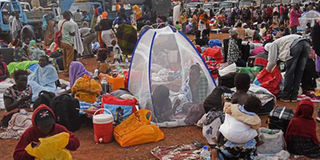WFP cuts down food rations for refugees

Uncertainty. South Sudan refugees at a makeshift camp at Nimule border in Uganda in July. PHOTO BY AFP
What you need to know:
- Crisis. Food ration cut by 50 per cent starting next month, comes at the time WFP is struggling to raise $67 million to cover its refugee operation for the next six months.
- The August 2016 Integrated Food Security Phase Classification (IPC) analysis report says that 83 per cent of the Ugandan population [30,892, 131] could be food secure, 16 per cent will be stressed [5, 958, 155] while 1 per cent [390, 165] most of whom are from Karamoja sub-region will be faced with food crisis.
YUMBE. Some half a million refugees in Uganda will beginning next month start receiving reduced food rations from World Food Organisation [WFP] due to insufficient funding.
The food ration cut by 50 per cent starting next month, comes at a time WFP is struggling to raise $67 million to cover its refugee operation for the next six months to urgently address required food needs all over the world.
Uganda currently hosts about 650, 000 refugees fleeing violence and human rights abuses, about half of them from South Sudan while others are from Burundi, Rwanda and the Democratic Republic of Congo.
The head of operations at WFP, Mr Pedro Matos, said they are feeding about 650,000 refugees in Uganda and that they spend about $12 million a month on feeding refugees in various camps in the country.
“As WFP, we have done everything we can to avoid reducing rations, using all means at our disposal to cover critical funding gaps but this is not possible now and cutting rations is the last resort and we’re doing it in order to fill the gap of limited food currently available,” Mr Matos told Daily Monitor at Bidi Bidi Refugee camp last week.
He said every month WFP provides for refugee vulnerable families Shs36,000 and other families Shs28,000 to buy food and other essential and that beginning in November the refugees will receive 18, 000 and 14,000 respectively.
“But with the influx of South Sudan refugees and competing humanitarian needs around Africa and the world over, our budgets are tight and we are calling for more funding so that we can work with the office of the United Nations High Commissioner for Refugees to meet the urgent needs of these vulnerable people who have no other means of support,” Mr Matos added.
This will be the second time this year, United Nations High Commissioner for Refugees and WFP are halving food rations due to growing number of South Sudan refugees amidst dwindling funding.
The Minister of State for Disaster Preparedness, Mr Musa Ecweru, said there was severe food shortage across the country due to poor harvests after a long dry spell and appealed to WFP to halt the decision to reduce food ration to the refugees.
The August 2016 Integrated Food Security Phase Classification (IPC) analysis report says that 83 per cent of the Ugandan population [30,892, 131] could be food secure, 16 per cent will be stressed [5, 958, 155] while 1 per cent [390, 165] most of whom are from Karamoja sub-region will be faced with food crisis.
“If this is what is happening to us as a country then what would happen to refugees who are not doing farming and business to survive. I think WFP should reconsider its decision,” said Mr Ecweru.
HEALTH CONCERN
According to Dr Nasur Muwonge, the officer in- charge of medical services at the Bidi Bidi Refugee Centre, the decision to halve food rations for the refugees would leave children and elders in the camps malnourished.
“We visit the camps three times a week to treat the patients, especially pregnant women, children and the elderly, but with reduction of food rations, the situation will become tricky as more people would become sick. Our appeal is that donors intervene to save the situation,” Dr Muwonge said.




